Series 11 “Kerblam!” Review – Five Stars! Would Order Again!
Clint Hassell gives his spoiler-filled commentary on the seventh episode of Doctor Who Series 11.
Note: this review contains full SPOILERS for episode 7 of Series 11.

“Kerblam!” is the best episode of Doctor Who since Series 8’s “Listen.” Certainly, many other praise-worthy episodes have aired since Steven Moffat’s 2014 magnum opus, but, for every brilliant “Dark Water” there is an overstuffed, nonsensical “Death in Heaven.” “Face the Raven” invents its own internal logic, seemingly on the fly; “Hell Bent” is torn between two disparate storylines; “Rosa” features one-dimensional characters. While all are widely regarded as some of the finest episodes of modern Who, none achieve the synergy of script, direction, acting, set design, and score as “Kerblam!”
Most importantly, “Kerblam!” is incredibly well-written. Pete McTighe’s first Doctor Who script not only demonstrates that he is a capable writer – – Dan Cooper mentioning that his arcadian-lacquered DAD pendant would “outlast anything . . . including me” is perfect foreshadowing; Kira savoring the opening her Employee of the Day gift heightens that scene’s tension – – but also that he is a master of the series’ unique mix of science-fiction, adventure, and satire. Note that McTighe’s decision to have the Doctor and her companions pose as new Kerb!am employees allows for the episode’s necessary exposition to occur in an organic way, as part of their training. In the scene where the four are being scanned into the system and processed for placement within the company, the tightly written dialogue bounces between providing details about Kerb!am’s operating procedures, hinting at the Kandokian political environment, and outlining Judy Maddox’s personality. What seems like a throwaway in-joke about the Doctor having two hearts is actually a deft clue as to why she and Yasmin are initially assigned more physically demanding jobs than the elderly Graham or the dyspraxic Ryan. Background lines from later scenes are similarly important: “Our reception is currently in night mode,” heard over the public address system, explains why a corporation large enough to cover a moon’s surface would have its lights dimmed. In fact, the episode seems to go out of its way to demonstrate how smartly written it is, with Judy Maddox explaining to the Doctor, Yasmin, and Ryan that their “group loops told me you were back here,” when Maddox merely catching the three in Slade’s office would’ve sufficed.
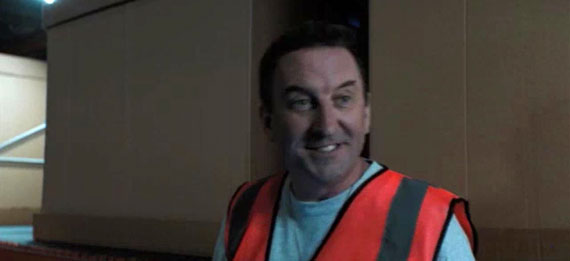
“Doctor Who and the Uncaring Corporation” has been a theme in previous adventures, with the Doctor taking on broadcast media, in “The Long Game,” the health care system, in “New Earth” and “The Girl Who Waited,” and the mechanized constructs of the Cybus Corporation, in “Rise of the Cybermen”/”The Age of Steel.” Even the afterlife is reduced to a business in “Dark Water.” What is impressive is how McTighe pushes “Kerblam!” far beyond the expected “the Doctor takes on capitalism.” Rather than simplifying mercantilism to its most basic ideas – – as both “Rosa” and “Demons of the Punjab” did with the concept of racism – – McTighe presents a layered, complex examination of the moral implications of every character’s actions. Dan Cooper admits to only seeing his daughter twice a year, substituting a poster on her bedroom wall for time with him, but then admits that, “[W]e’ve only got ourselves to blame. Once, we were busy staring at our phones, [and] technology went and nicked our jobs.” Is automatization a threat to human success or a tool for it? Jarva Slade and Judy Maddox both want to do what is right, but are hampered – – not by oversight, but by the lack thereof. So much is automated and handled for them, that not only is there no one to whom to report the missing employees, but the two don’t even have effective communication with each other. They are divided.

Further, “Kerblam!” raises questions about what defines an ethical choice. Charlie is fighting for better living conditions for more people, but is willing to hurt others to be noticed. The Kerb!am operating system tries to stop Charlie’s murderous plan, but kills Kira to do so. No character is completely in the moral right or in the wrong, in “Kerblam!” Rather, the episode exploits its futuristic setting to ponder a modern-day ethical dilemma, making “Kerblam!” a stunning example of science fiction at its finest.
In fact, not only does the episode not pit the Doctor against capitalism, it uses the audience’s perception that “capitalism is bad” to its advantage. Dan Cooper mentions that there is “constant random monitoring,” that there is “no such thing as privacy” at Kerb!am. The episode shows the plight of the Kerb!am workers, while carefully misdirecting the audience’s attention towards the autonomous robots and the company itself as the problem. Note that Jarva Slade is stressed out and lacks people skills, making it easy to mistake “inconsiderate” for “evil overlord.”

“Kerblam!” offers some of the series’ best references to its own past, and, more importantly, succeeds where many other Series 11 episodes have failed, by making effective use of all three companions. In an early scene, Yasmin and the Doctor question Judy, accentuating Yaz’s training as a police officer. Later, Yaz restrains Charlie by putting him into a physical hold. Ryan figures out that a “fully automated system” wouldn’t require a clipboard or a filing cabinet. In the third act, he is responsible for getting Yasmin and Charlie down to the seemingly inaccessible distribution center. Graham acquires schematics for the Kerb!am complex, and knows exactly where to find Ryan’s suggested “Kerb!am version 1.0.”
Moreover, the guest cast is effectively used, with each character playing an important role in the narrative, and every actor turning in a memorable performance. “Head of People” Judy Maddox displays a nervous humor, without devolving into artifice or being distractingly campy, showing that actress Julie Hesmondhalgh has range. The surprise reveal of her character is that she is every bit as hard-working and caring as she claims to be, playing against the stereotype of “self-serving executive.” Dan Cooper is similarly self-effacing, with just a hint of comedy to remind the audience that the episode borders on satirical, without destroying the dramatic weight needed for the narrative to thrive. Claudia Jessie’s Kira Arlo is convincingly lured into danger with the promise of a gift, a sad look of acceptance in her eyes as she reaches for the box’s lone piece of bubble wrap.
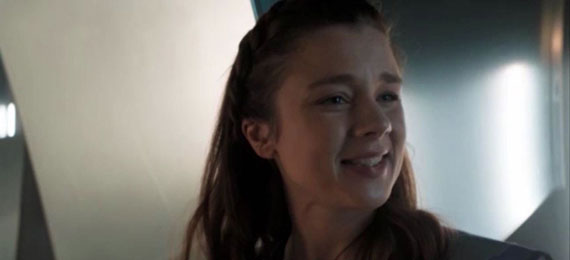
Beyond the purposeful plot and character work, McTighe laces “Kerblam!” with bitingly funny humor, much of which informs the episode’s characterization. Graham’s frustration at being assigned to maintenance detail manifests itself in his sly, cutting, and/or blatantly false statements to his co-worker, Charlie. “[I’ve] been on my own down here for a while, now,” Charlie says. “I can tell,” Graham interjects, quickly, before changing subjects. Antique Kerb!am robot Twirly experiences the robotic version of an existential crisis. “The future is very confusing for my protocols,” he laments, but when provided a concrete way of assisting, he hilariously cries, “I am only a deliverybot!” Much of the episode’s humor is even more subtle, with Twirly telling a provoked Doctor that, “Customers with your current medical symptoms browse blood pressure medication.” Later, when Jarva Slade states that the Kerb!am warehouse operations will be suspended for a month, Judy Maddox assuages that, “All our workers are being given two weeks paid leave.”
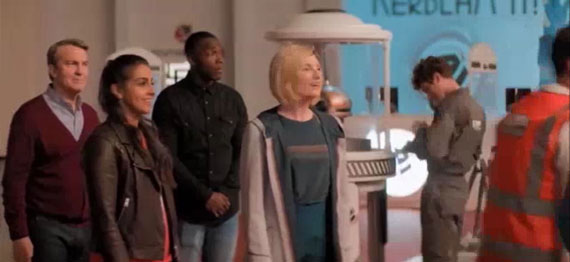
Beyond its script and guest actors, “Kerblam!” is notable for how its set design, special effects, and score enhance an already terrific episode. The set design is (literally!) out-of-this-world, with every gleaming surface, flickering computer interface, and robot the right mix of futuristic and familiar. The special effects add to the narrative, rather than substitute for a thin story, and are mostly used to display the massive scope of the Kerb!am warehouse. Composer Segun Akinola’s driving electronic score is blaringly obvious, though perfectly at home, especially in a scene where Yaz searches for Dan in the seldom-used “triple nines” area of the Kerb!am warehouse.
To give a sense of how masterfully “Kerblam!” integrates all aspects of filmmaking, one could examine closely the scene where the Doctor and Ryan are packing Kerb!am order boxes with Kira. The dialogue explores Ryan’s pre-TARDIS life, demonstrates how performing “really repetitive” tasks have affected the morale of the Kerb!am workers, details the politics behind Kandokan labor laws, describes Kira’s “great approach to life,” and establishes where the “HELP ME” packing slip was generated. The script pointedly gives all three characters a physical task, so they are not merely standing around, talking. The actors are filmed from a variety of angles, which not only displays the packing process but also adds a kinetic sense of movement to an otherwise stagnant scene. Claudia Jessie portrays Kira as self-depreciating and personable. In any other adventure, she’d be the featured guest star in a Doctor-lite episode – – a Sally Sparrow, perhaps. Here, she’s just a menial worker, emphasizing the dehumanizing quality of her work. Kira’s only ever received one gift: a life-changing box of chocolates, from Judy Maddox, for her birthday. Initially, this statement seems to undercut the realism of the episode; how could she have never gotten a present from her parents or a friend? However, this is McTighe’s way of cleverly instructing the audience to be looking at “Kerblam!” as allegory. The light design validates this as it literally dims when the Doctor asks about the mysterious packing slip that brought Team TARDIS to investigate.
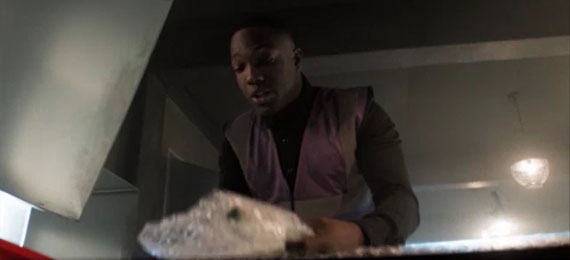
Boasting a thoughtful script by Pete McTighe – – not to mention the most hilariously twisted threat ever seen in modern Who – – “Kerblam!” is everything one could want from an episode of Doctor Who: a perfect mix of action, humor, and debate; a narrative that references the series’ past while serving its current cast; and timely satire disguised as science fiction. Featuring a vibrantly memorable guest cast, the episode is elegantly realized and sure to please both mindful viewers hungry for a layered, nuanced look at mercantilism and morality, and casual fans looking for a funny, adventurous romp through the corporate future.
Random Musing
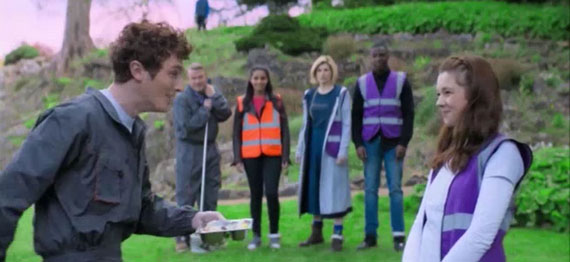
(Time) Capsule Review

Catch-up:
- Episode 1 Review
- Episode 2 Review
- Episode 3 Review
- Episode 4 Review
- Episode 5 Review
- Episode 6 Review








